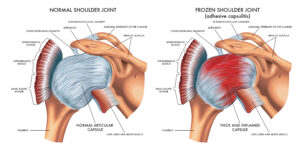Frozen shoulder, also called adhesive capsulitis, is a condition that causes stiffness, pain, and a gradual loss of motion in the shoulder joint. While it can be frustrating and even disabling, understanding how and why it develops is the first step toward recovery. At Advanced Orthopedics and Sports Medicine Institute (AOSMI), Dr. Stacey Gallacher provides evaluation and treatment options for this condition.
How Frozen Shoulder Happens

Frozen shoulder occurs when the capsule of connective tissue that surrounds the shoulder joint becomes inflamed and tight. Over time, this thickened capsule restricts movement. In some cases, the condition develops after a period of immobility, such as recovering from surgery or an injury.
- Why frozen shoulder happens is not always fully understood, but risk factors include diabetes, thyroid disorders, and certain hormonal changes.
- The condition most often affects women between the ages of 40 and 60.
Why Frozen Shoulder Is More Common in Women
Research shows frozen shoulder occurs more frequently in women, and frozen shoulder and menopause are closely linked. Lower estrogen levels during menopause may affect joint tissues, reducing flexibility and increasing the risk of stiffness. This helps explain why frozen shoulder is common in females.
Where Frozen Shoulder Hurts
Patients typically feel pain deep within the shoulder joint, especially when lifting the arm or reaching overhead. The discomfort can extend into the upper arm. Some patients also report tension in the neck and upper back. While the shoulder joint itself is the main source of pain, changes in posture and movement can cause surrounding muscles to become sore.
What Frozen Shoulder Looks Like
Frozen shoulder does not usually cause visible swelling or deformity. Instead, the main sign is limited movement:
- Difficulty lifting the arm overhead
- Trouble reaching behind the back
- Limited rotation of the arm
These movement restrictions are often what lead patients to seek care.
When Does Frozen Shoulder Go Away?
Frozen shoulder progresses in three stages:
- Freezing stage (Pain) – Pain increases, and movement gradually decreases.
- Frozen stage (Stiff) – Pain may lessen, but stiffness remains significant.
- Thawing stage (Recovery) – Motion gradually improves over several months.
The timeline varies for all patients. For some, recovery takes about a year. For others, it may take up to two years.
When Does Frozen Shoulder Require Surgery?
Most cases improve without surgery through physical therapy, pain management, and sometimes injections. Surgery may be considered if symptoms persist despite conservative treatment and daily activities remain limited. Options may include arthroscopic capsular release or manipulation under anesthesia.
Which Doctor for Frozen Shoulder?
Patients often wonder which doctor to see for frozen shoulder. The best option is an orthopedic specialist with experience in shoulder conditions. At AOSMI, Dr. Stacey Gallacher provides specialized care for frozen shoulder in Freehold and Belmar, NJ.
Key Takeaways
- Frozen shoulder is caused by thickening of the shoulder capsule.
- Women, especially during menopause, are at higher risk.
- Symptoms include deep shoulder pain, stiffness, and loss of mobility.
- Recovery often takes months to years.
- Surgery is considered only if conservative care fails.
 About Dr. Stacey Gallacher
About Dr. Stacey Gallacher
Dr. Stacey Gallacher is a Board-Certified Orthopedic Surgeon with dual fellowship training in Shoulder & Elbow and Trauma Surgery. She practices at AOSMI, serving patients in Freehold and Belmar, NJ. Dr. Gallacher specializes in shoulder conditions such as frozen shoulder, rotator cuff injuries, and traumatic injuries, offering comprehensive and individualized care to each patient. If you’re struggling with shoulder pain or limited mobility, don’t wait for it to get worse.
Request an appointment with Dr. Stacey Gallacher.
This blog is for educational purposes only and is not medical advice. Every patient’s case is unique. Always consult with a qualified healthcare provider for personalized recommendations.







